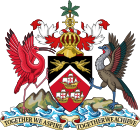The politics of Tanzania takes place in a framework of a unitary presidential democratic republic, whereby the President of Tanzania is both head of state and head of government, and of a multi-party system. Executive power is exercised by the government. Legislative power is vested in both the government and parliament. The party system is dominated by the Chama Cha Mapinduzi. The Judiciary is independent of the executive and the legislature.

The politics of Trinidad and Tobago function within the framework of a unitary state regulated by a parliamentary democracy modelled on that of the United Kingdom of Great Britain and Northern Ireland, from which the country gained its independence in 1962. Under the 1976 republican Constitution, the monarch was replaced as head of state by a President chosen by an electoral college composed of the members of the bicameral Parliament, consisting of the Senate and the House of Representatives.

The politics of Barbados function within a framework of a parliamentary republic with strong democratic traditions; constitutional safeguards for nationals of Barbados include: freedom of speech, press, worship, movement, and association.

A member of parliament (MP) is the representative in parliament of the people who live in their electoral district. In many countries with bicameral parliaments, this term refers only to members of the lower house since upper house members often have a different title. The terms congressman/congresswoman or deputy are equivalent terms used in other jurisdictions. The term parliamentarian is also sometimes used for members of parliament, but this may also be used to refer to unelected government officials with specific roles in a parliament and other expert advisers on parliamentary procedure such as the Senate parliamentarian in the United States. The term is also used to the characteristic of performing the duties of a member of a legislature, for example: "The two party leaders often disagreed on issues, but both were excellent parliamentarians and cooperated to get many good things done."
The government of the U.S. state of Missouri is organized into the state government and local government, including county government, and city and municipal government.
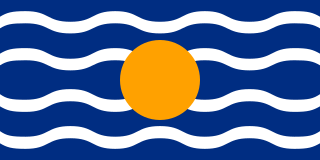
The West Indies Federation, also known as the West Indies, the Federation of the West Indies or the West Indian Federation, was a short-lived political union that existed from 3 January 1958 to 31 May 1962. Various islands in the Caribbean that were part of the British Empire, including Trinidad and Tobago, Barbados, Jamaica, and those on the Leeward and Windward Islands, came together to form the Federation, with its capital in Port of Spain, Trinidad and Tobago. The expressed intention of the Federation was to create a political unit that would become independent from Britain as a single state — possibly similar to Canada, the Federation of Australia, or the Federation of Rhodesia and Nyasaland. Before that could happen, the Federation collapsed due to internal political conflicts over how it would be governed or function viably. The formation of a West Indian Federation was encouraged by the United Kingdom, but also requested by West Indian nationalists.

The Inter-American Court of Human Rights is an international court based in San José, Costa Rica. Together with the Inter-American Commission on Human Rights, it was formed by the American Convention on Human Rights, a human rights treaty ratified by members of the Organization of American States (OAS).

The president of the Republic of Trinidad and Tobago is the head of state of Trinidad and Tobago and the commander-in-chief of the Trinidad and Tobago Defence Force. The office was established when the country became a republic in 1976, before which the head of state was the Queen of Trinidad and Tobago, Elizabeth II. The last governor-general, Sir Ellis Clarke, was sworn in as the first president on 1 August 1976 under a transitional arrangement. He was formally chosen as president by an electoral college consisting of members of both houses of Parliament on 24 September 1976, which is now celebrated as Republic Day.

Trinidad and Tobago elects its House of Representatives on the national level. The head of government, the prime minister, is chosen from among the elected representatives on the basis of his or her command of the support of the majority of legislators. The Parliament of the Republic of Trinidad and Tobago has two chambers. The House of Representatives has 41 members, elected for a maximum five-year term in single-seat constituencies. The Senate has 31 members: 16 government senators appointed on the advice of the prime minister, six opposition senators appointed on the advice of the leader of the opposition and nine so-called independent senators appointed by the president to represent other sectors of civil society. The president is elected for a five-year term by an electoral college consisting of the members of both houses of Parliament. Other elected bodies include the local government bodies in Trinidad and the Tobago House of Assembly, which handles local government in the island of Tobago and is entrenched in the constitution.
Gillian Lucky is a Justice of Appeal at the Supreme Court of Judicature for Trinidad and Tobago. She was previously a High Court Judge, Director of the Police Complaints Authority, and a Member of Parliament for Pointe-à-Pierre.

The States of Alderney is the parliament/council and the legislature of Alderney, part of the Bailiwick of Guernsey. The origin of the States is unknown, but has operated from the medieval period. The States of Alderney comprises ten Members, and a President of the States of Alderney, currently William Tate who was elected in 2019 and re-elected in 2020.

Keith Christopher Rowley, is a Trinidadian politician serving as the seventh prime minister of Trinidad and Tobago, first elected into office on 9 September 2015 and again following the 2020 general election. He has led the People's National Movement (PNM) since May 2010 and was Leader of the Opposition from 2010 to 2015. He has also served as the Member of the House of Representatives for Diego Martin West since 1991. He is a volcanologist by profession, holding a doctorate in geology, specializing in geochemistry.
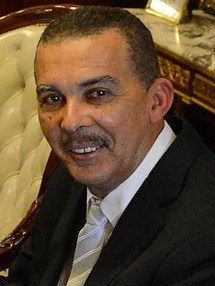
Anthony Thomas Aquinas Carmona is a Trinidadian politician who was the fifth President of Trinidad and Tobago from 2013 to 2018. Previously, he was a High Court Judge at the Supreme Court of Trinidad and Tobago, and he served as a Judge of the International Criminal Court from 2012 to 2013.
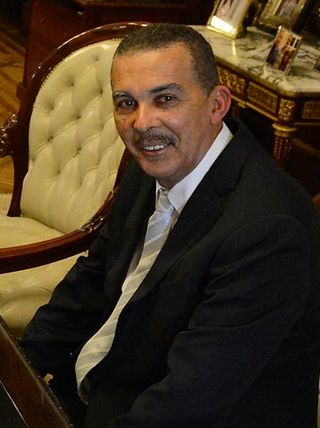
Indirect presidential elections were held in Trinidad and Tobago on 15 February 2013.
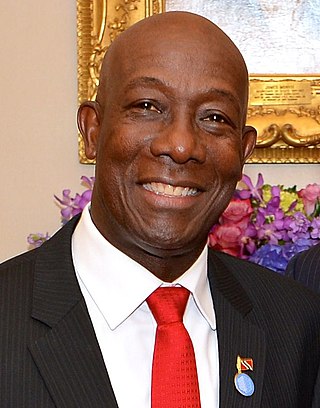
On Monday November 28, 2016, local elections were held in Trinidad, the bigger of the two main islands of Caribbean island state Trinidad and Tobago. The elections were held slightly more than one month later than originally planned. They were held to select the membership of 14 local authorities, with representatives elected from 137 single-member districts across the country. The entire membership of Trinidad's local government was renewed as a result of these elections, with the previous set of local representatives having been elected in 2013. The elections came roughly a year following the 2015 parliamentary general election.

Paula-Mae Weekes is a Trinidadian politician and jurist who was the sixth president of Trinidad and Tobago from 2018 to 2023. She is the first female President of Trinidad and Tobago, as well as the second female head of state in Trinidad and Tobago after Elizabeth II and the second female president of African descent in the Americas following Ertha Pascal-Trouillot.
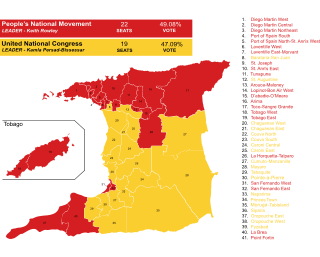
General elections were held in Trinidad and Tobago on Monday, 10 August 2020, to elect 41 members to the 12th Trinidad and Tobago Republican Parliament. It was the 14th election since gaining independence from the United Kingdom in 1962 and the 22nd national election in Trinidad and Tobago ever. Tracy Davidson-Celestine, political leader of the Tobago Council of the People's National Movement (PNM) became the first woman to lead a Tobagonian political party with representation in the House of Representatives. Additionally, two of the three largest parties elected in 2015, the United National Congress (UNC) and the Congress of the People (COP), were led by women.

The Chief Secretary of Tobago is the leader of the Tobagonian Government. The Chief Secretary chairs the Tobagonian Cabinet and is primarily responsible for the formulation, development and presentation of Tobagonian Government policy. Additional functions of the Chief Secretary include promoting and representing Tobago in an official capacity, at home and abroad, and responsibility for constitutional affairs, as they relate to devolution and the Tobagonian Government.
Lovell Francis is a Trinidad and Tobago politician and diplomat. He is the current High Commissioner for Trinidad and Tobago to the Republic of South Africa. Francis was previously a Member of Parliament in the House of Representatives for Moruga/Tableland between 2015 and 2020, when he served as Minister of State in the Ministry of Education.
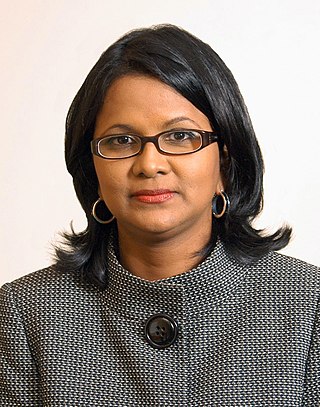
Indirect presidential elections were held in Trinidad and Tobago on 20 January 2023.
